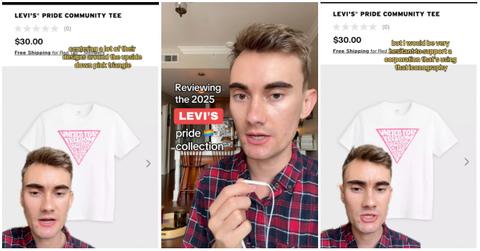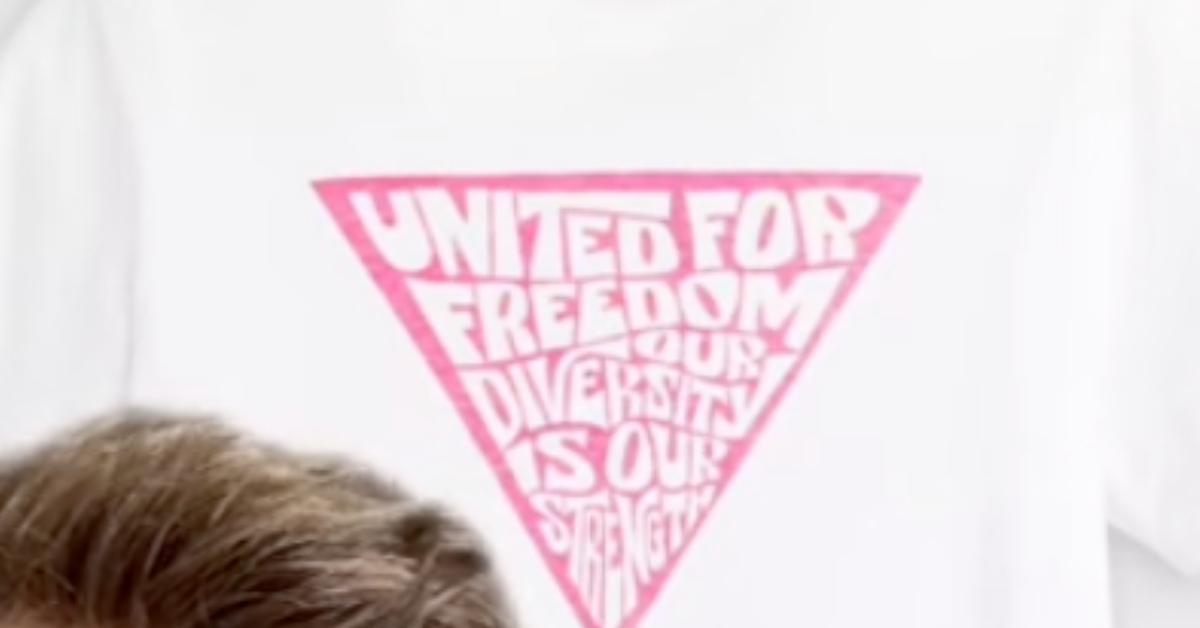Levi's Stirs up Controversy for Using a Pink Triangle Symbol in Its Pride Collection
The pink triangle symbol has dark roots among the LGBTQ+ community.
Published May 21 2025, 4:00 p.m. ET
Nothing signals the beginning of Pride Month quite like seeing retail stores turn their aisles into a rainbow frenzy. Don't get us wrong—we LOVE TO SEE IT, but in many cases, it can feel performative and like there aren't enough LGBTQ+ voices in the room, especially when the clothing items selected for the Pride collection reflect pivotal moments in LGBTQ+ history.
In May 2025, Levi Strauss & Co unveiled its Pride-themed merchandise, including several items, including a denim cap and the Pride One Family Trucker, which features the phrase "I know you know." However, several pieces featuring a pink triangle stirred up controversy for the brand on social media. Here's the scoop.
Levi's Pride collection featured a graphic with a powerful message.
The pink triangle is one of the powerful symbols of LGBTQ+ resistance. As TikTok user @connor.clary explained, the symbol was initially designed to shame LGBTQ+ people. Gay men, specifically, were forced to wear the triangle during the Holocaust in Nazi Germany. Per The History Channel, a downward-pointing pink triangle was sewn onto the shirts of gay men in concentration camps—to identify and further dehumanize them. Before then, homosexuality was illegal in Germany in 1871 and was enforced by the Nazi Party in 1933.
The pink triangle also included pedophiles and zoophiles grouped with gay men. The symbol was later reclaimed by LGBTQ+ activists in the 1970s. During the rise of the HIV/AIDS epidemic in the 1980s, the symbol was used as part of the Silence = Death Project. Connor explained in his video that the initiative was created around the pink triangle was to represent former President Ronald Reagan's "complicity" in the epidemic and how gay men were treated during the Holocaust.
The History Channel also shared that the Nazi Party didn't stop at signaling out gay men. Brown triangles were used for Romani people, red for political prisoners, green for criminals, blue for immigrants, purple for Jehovah's Witnesses and black for "asocial" people, including prostitutes and lesbians.
What did Levi's say about their Pride pink triangle designs?
Levi's didn't immediately address the controversy surrounding its pink triangle designs. However, social media continued buzzing after seeing Connor's TikTok rant about the design decision. Later in his TikTok, he scolded the company for not addressing the significance of the pink triangle in its branding.
“If they’re going to use a symbol that has such a heavy and dark history, I would love if they would just provide some kind of context as to why it’s there or give voice to the people who were impacted by the history of both the Holocaust and the AIDS epidemic—survivors of which are still here today,” Connor said.
In addition to the pink triangle, the content creator said he found the entire collection to be "underwhelming."
While many TikTok commenters agreed Levi's should've provided more context to its consumers, others defended the company by pointing that 99 percent of its shareholders voted to uphold its DEI programs in the face of pressure from the Trump administration.

